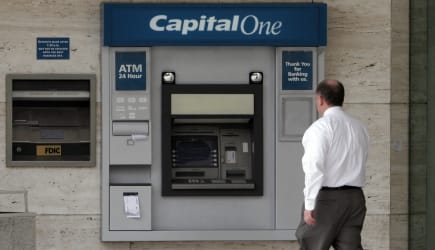
Capital One has run a series of clever ads with the tagline, "What's in your wallet?" Now it appears the company has tried to lay the groundwork so it can ask about your Capital One account via your regular phone or cell with fake caller ID, text message, or fax "with any frequency" and even showing up unannounced at home or work, according to the Los Angeles Times.
It's a set up for aggressive collection activities that could become a potential nightmare, particularly if the process involves your work life. Not many companies would be happy to field a series of messages or visits over a personal financial matter.
The issue arose with a new credit card agreement that affects consumers who have been issued a Capital One card. Here is the communications section that explains the company says it has:
We may contact you from time to time regarding your Account. We may contact you in any manner we choose unless the law says that we cannot. For example, we may:The section goes on to say that the company can use information they obtain from you or others to find you, that it may record conversations, and, unless prohibited by law, it can "modify or suppress caller ID and similar services and identify ourselves on these services in any manner we choose." In other words, Capital One might make you think you were picking up the phone for Joe's Pizzeria down the street.
(1) contact you by mail, telephone, email, fax, recorded message, text message, or personal visit;
(2) contact you using an automated dialing or similar device ("Autodialer");
(3) contact you at your home and at your place of employment;
(4) contact you on your mobile telephone;
(5) contact you at any time, including weekends and holidays;
(6) contact you with any frequency;
(7) leave prerecorded and other messages on your answering machine/service and with others; and
(8) identify ourselves, your relationship with us, and our purpose for contacting you even if others might hear or read it.
In 2012, a federal class action lawsuit claimed that Capital One had used "illegal credit and collection practices," according to ABC News. That same year, the Consumer Financial Protection Bureau reportedly fined Capital One $210 million for using high pressure tactics to sell consumers into add-on credit card services and for misleading them about the benefits, according to Forbes.
One reason for all the specificity in the agreement is that when it comes to debt collection and associated communications, there are some significant protections for consumers, according to the Federal Trade Commission.
For example, debt collectors are generally restricted to calling only between 8am and 9pm. The collector "may not communicate, in connection with the collection of any debt, with any person other than a consumer, his attorney, a consumer reporting agency if otherwise permitted by law, the creditor, the attorney of the creditor, or the attorney of the debt collector," which means a limit on the types of messages that could be left. If the collector "knows or has reason to know that the consumer's employer prohibits the consumer from receiving such communication," it is forbidden to try reaching the consumer at work -- and telling the collector that you are not allowed to receive collection calls at work might be enough to trigger that clause.
However, these factors only come into play if the consumer has not given prior consent or if a court has given permission. Being a card holder with Capital One would likely mean that the agreement would act as that consent.
Filed under: Company News
No comments:
Post a Comment